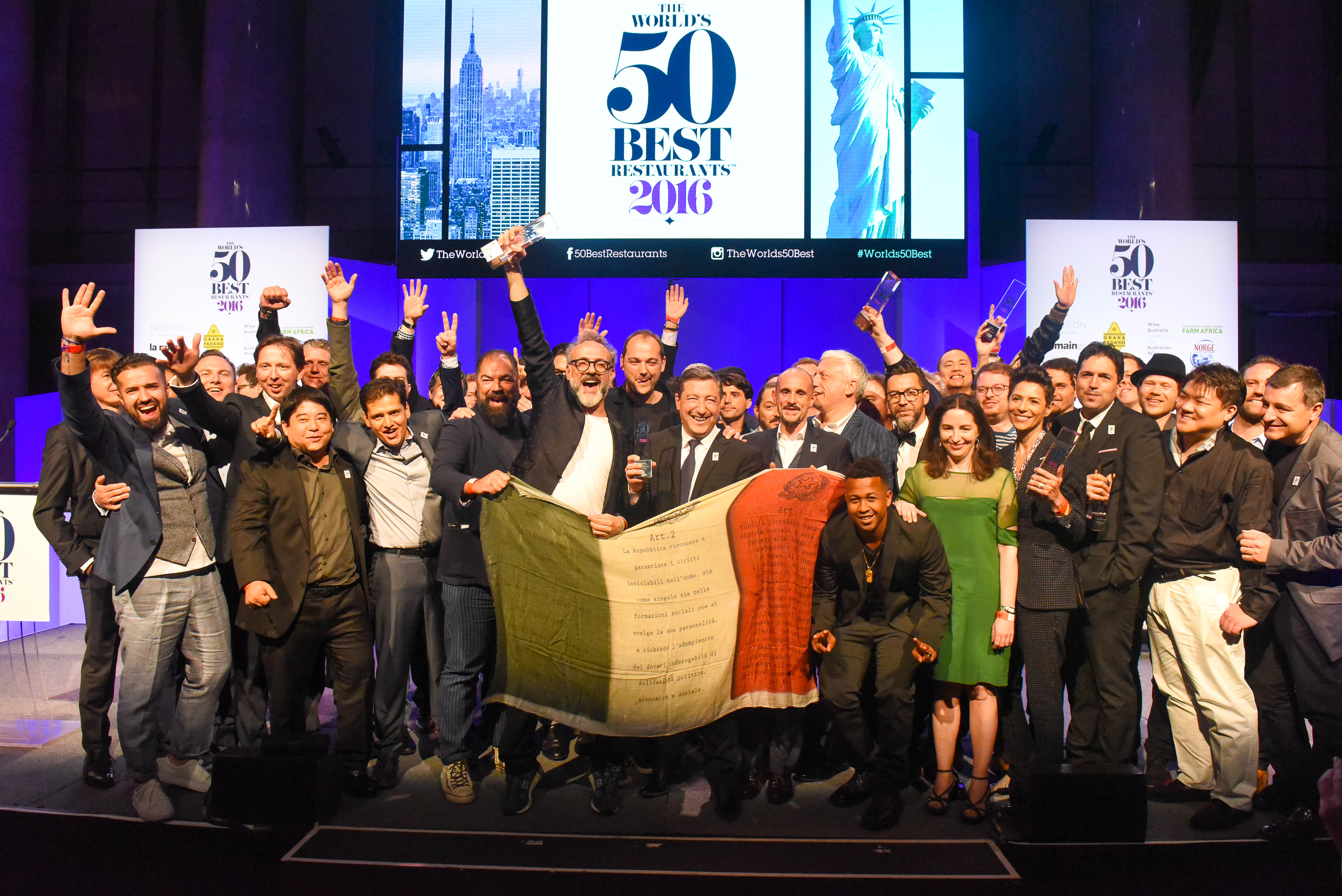
On the evening of June 13, a triumphant Massimo Bottura took to the stage wrapped in the colours of the Italian flag at The World’s 50 Best Restaurants awards at New York’s Cipriani Wall Street. It was a momentous occasion for Bottura – a chef known for re-examining the traditions of Italian cuisine through the twin lenses of art and music – and his flagship in Modena, Osteria Francescana, which became the first restaurant in Italy to ascend to the top position.
“In Italy, we have three things that are untouchable: soccer, the Pope, and food,” the chef joked, when asked what the honor could mean for his home country. “I’m going to use the spotlight to keep doing what I’ve been doing. This can be an opportunity to attract the great gourmets of the world to come to Italy and enjoy food from a contemporary perspective.”
Previously ranked number two on the list, Osteria Francescana displaced last year’s overall winner, Girona restaurant El Cellar de Can Roca, which dropped to second place. Third place went to New York’s Eleven Madison Park, which ranked the highest among restaurants in North America for the third consecutive year.
As in past years, Europe remained dominant, boasting 26 entries in the top 50. The continent also claimed half of the highest 10 slots – with Asador Etxebarri in Axpe, Mirazur in Menton, and Steirereck in Vienna sliding in to the coveted top tranche for the first time. Once again, Spain was well represented on the list with seven entries, while the other European entries hailed from Italy (four), the UK (three), Denmark (two), France (two), Germany (two), Austria (one), Russia (one), Sweden (one), Switzerland (one), and the Netherlands (one).
New entries included San Francisco’s Saison and New York’s Estela, as well as Tim Raue in Berlin and The Clove Club in London, which was the highest newcomer at number 26. Copenhagen’s Geranium was one of four re-entries – all of which were European restaurants. Rising 31 positions from number 44 to number 13, Maido in Lima was the highest climber. The announcement of this year’s One to Watch elicited thunderous applause from the audience as chef Zaiyu Hasegawa accepted the award on behalf of his restaurant, Jimbocho Den in Tokyo. A new Art of Hospitality award was given to Eleven Madison Park.
Other individual recognitions went to French chef Alain Passard of Arpege, who received the Lifetime Achievement award, and El Cellar de Can Roca’s Joan Roca, who won the Chef’s Choice award. Two-Michelin-starred chef Dominique Crenn, based in San Francisco, picked up the Best Female Chef award. An outspoken activist, Crenn dedicated her award to “diversity and tolerance” in the wake of the recent tragedy in Orlando, Florida.
On an international level, Latin America gained a slight edge over North America, with seven and six total entries respectively. Among the European contingent, Italy made a strong showing — in addition to being home to the number one restaurant. Piazza Duomo in Alba climbed 10 notches to number 17, and former lister Combal Zero in Rivoli regained a spot in the top 50. Entries from Asia slipped slightly in the overall rankings, with Bangkok’s Gaggan falling from number 10 to number 23, leaving only one restaurant from the region (Narisawa) in the highest slots.
The most notable change, however, was the location of the ceremony, which was held outside of London for the first time in 15 years. The gala in New York kicked off what the organizers have described as an international tour for the World’s 50 Best awards. The decision, says group editor of the World’s 50 Best Restaurant William Drew, was prompted in part by positive responses to locale changes for the Latin America’s 50 Best Restaurants awards, which moved from Lima to Mexico City last year and the Asia’s 50 Best Restaurants awards, which relocated from Singapore to Bangkok this year. “We’re excited to expose people to new experiences and places,” Drew said, noting that the restaurant industry has become an increasingly global profession. The 2017 World’s 50 Best Restaurant awards ceremony will take place in Melbourne.
Prior to the main event on June 13th was a new one-day symposium comprised of “Tastemaker” themed presentations on gastronomic trends, followed by a preview screening of a new episode of the popular Netflix series “Chef’s Table,” featuring Gaggan Anand of Gaggan in Bangkok. After the screening, Anand revealed plans to close his restaurant by 2020 in order to “invest in the next generation” of young talent.
A growing global trend, fermentation was the focus of the Tastemaker talks by Andre Chiang from Singapore, Mingoo Kang from Korea, and Yannick Alleno from France. Chiang described how experimenting with fermented juices and house-brewed kombucha has opened up food pairing possibilities at his restaurants. Mingoo Kang discussed the essential role that fermentation plays in traditional Korean cuisine, while Yannick Alleno explained how combining the techniques of cryo-extraction and fermentation has enabled him to create “modern French sauces” that clearly express the terroir of ingredients. “Terroir is not just territory but also a taste. Fermentation enhances the energy of products and creates a memory imprint,” he said. As all three chefs pointed out, fermentation is an ancient preservation technique that discourages food waste and inspires greater respect for nature.
Sustainability and social responsibility were major themes throughout the week of events surrounding the World’s 50 Best Restaurant awards. “We are an example for the others,” Massimo Bottura concluded, referring to the impact that chefs can have on the world at large. “Culture brings consciousness and social responsibility.”
Melinda Joe
